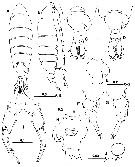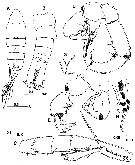|
|
 |
|
Calanoida ( Order ) |
|
|
|
Diaptomoidea ( Superfamily ) |
|
|
|
Tortanidae ( Family ) |
|
|
|
Tortanus ( Genus ) |
|
|
|
Atortus ( Sub-Genus ) |
|
|
| |
Tortanus (Atortus) magnonyx Ohtsuka & Conway, 2005 (F,M) | |
| | | | | | | Ref.: | | | Ohtsuka & Conway, 2005 (p.66, figs. F,M); Francis & Bijoy Nandan, 2019 (p.433, Table 4, 5). |  issued from : S. Ohtsuka & D.V.P. Conway in J. Mar. Biol. Ass. U.K., 2005, 85 (1). [p.67, Fig.2]. Female (from mahé, Seychelles): A-B, habitus (dorsal and lateral, respectively); C-D, posterior prosome and urosome (dorsal); E, genital compound somite (dorsal); F-G, postrior prosome and urosome (right and left lateral view, respectively); H, genital compound and anal somites (ventral); I, P5 (posterior); J, phoront of apostome on intercoxal sclerite of P4. Scale bars in mm. Nota: Cephalosome and 1st pediger separate, 4th and 5th fused. Cephalosome protruded anteriorly into round expansion in which naupliar eyes involved and strongly grooved at dorsal mid-length. Posterior prosome slightly asymmetrical, with right side more swollen. P5 with both coxae and intercoxal sclerite completely fused to form common base; exopod unidegmented, left slightly lionger than right, each with 1 inner middle and 2 terminal, acutely pointed processes, terminal processes unequal on left but almost equal on right.
|
 issued from : S. Ohtsuka & D.V.P. Conway in J. Mar. Biol. Ass. U.K., 2005, 85 (1). [p.68, Fig.3]. Male: A, habitus (dorsal); B, urosome (dorsal); C, right geniculate A1 (segments XVI to XXIV-XXVIII); D, P5 (anterior); E, right P5 (anterior); F, right P5 (posterior); G, basal process of right P5 with 1 terminal and 1 proximal setae; H, terminal portion of left P5. Scale bars in mm.
|
 Issued from : S.V. Francis & S. Bijoy Nandan in Turkish J. Zool., 2019, 43. [p.434, Table 4]. Differential diagnosis of T. magnonyx female. Compare with other species of the subgenus Atortus species from the Indian Ocean. Morphological characters female: - Genital compound somite strongly asymmetrical, with the pointed process on the right ventrolateral side.
|
 Issued from : S.V. Francis & S. Bijoy Nandan in Turkish J. Zool., 2019, 43. [p.435, Table 5]. Differential diagnosis of T. magnonyx male. Compare with other species of the subgenus Atortus species from the Indian Ocean. Morphological characters male: - Left P5 subdistal seta serrated along inner margin. Right P5 basis tapering proximally with triangular process.
| | | | | NZ: | 1 | | |
|
Distribution map of Tortanus (Atortus) magnonyx by geographical zones
|
| | | | | | | Loc: | | | SW Indian: Seychelles (Mahé: Baie Ternay), Mauritius (lagoon), Madagascar (Ile Ste Marie: Baie des Forbans) | | | | N: | 1 | | | | Lg.: | | | (945) F: 2,17-2,25; 2,31-2,49; 2,20-2,31; M: 1,89-1,93; 2,09-2,20; 1,79-1,94; {F: 2,17-2,49; M: 1,79-2,20} | | | | Rem.: | Inshore.
For Ohtsuka & Conway (2005, p.69) the presence of apostome phoronts on the swimming legs is interesting, as these were also recorded from shallow- and deep-water planktonic copepods in the Arabian Sea (Sewell, 1951). According to Ohtsuka & al. (2004), apostomes are likely to play an important ecological role as histophagous ciliates round the coast of western Japan and may thus also be important around the oceanic islands of the Indian Ocean. | | | Last update : 11/02/2020 | |
|
|
 Any use of this site for a publication will be mentioned with the following reference : Any use of this site for a publication will be mentioned with the following reference :
Razouls C., Desreumaux N., Kouwenberg J. and de Bovée F., 2005-2026. - Biodiversity of Marine Planktonic Copepods (morphology, geographical distribution and biological data). Sorbonne University, CNRS. Available at http://copepodes.obs-banyuls.fr/en [Accessed January 08, 2026] © copyright 2005-2026 Sorbonne University, CNRS
|
|
 |
 |





